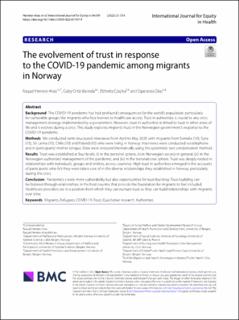| dc.contributor.author | Herrero-Arias, Raquel | |
| dc.contributor.author | Ortiz-Barreda, Gaby | |
| dc.contributor.author | Czapka, Elzbieta | |
| dc.contributor.author | Diaz Perez, Esperanza | |
| dc.date.accessioned | 2022-12-23T08:20:28Z | |
| dc.date.available | 2022-12-23T08:20:28Z | |
| dc.date.created | 2022-11-17T20:50:08Z | |
| dc.date.issued | 2022 | |
| dc.identifier.issn | 1475-9276 | |
| dc.identifier.uri | https://hdl.handle.net/11250/3039310 | |
| dc.description.abstract | Background
The COVID-19 pandemic has had profound consequences for the world’s population, particularly for vulnerable groups like migrants who face barriers to healthcare access. Trust in authorities is crucial to any crisis management strategy implemented by a government. However, trust in authorities is linked to trust in other areas of life and it evolves during a crisis. This study explores migrants’ trust in the Norwegian government’s response to the COVID-19 pandemic.
Methods
We conducted semi-structured interviews from April to May 2020 with migrants from Somalia (10), Syria (15), Sri Lanka (10), Chile (10) and Poland (10) who were living in Norway. Interviews were conducted via telephone and in participants’ mother tongue. Data were analysed thematically using the systematic text condensation method.
Results
Trust was established at four levels: (i) in the personal sphere, (ii) in Norwegian society in general, (iii) in the Norwegian authorities’ management of the pandemic, and (iv) in the transnational sphere. Trust was deeply rooted in relationships with individuals, groups and entities, across countries. High trust in authorities emerged in the accounts of participants who felt they were taken care of in the diverse relationships they established in Norway, particularly during the crisis.
Conclusion
Pandemics create more vulnerability but also opportunities for trust-building. Trust-building can be fostered through relationships in the host country that provide the foundation for migrants to feel included. Healthcare providers are in a position from which they can nurture trust as they can build relationships with migrants over time. | en_US |
| dc.language.iso | eng | en_US |
| dc.publisher | BMC | en_US |
| dc.rights | Navngivelse 4.0 Internasjonal | * |
| dc.rights.uri | http://creativecommons.org/licenses/by/4.0/deed.no | * |
| dc.title | The evolvement of trust in response to the COVID-19 pandemic among migrants in Norway | en_US |
| dc.type | Journal article | en_US |
| dc.type | Peer reviewed | en_US |
| dc.description.version | publishedVersion | en_US |
| dc.rights.holder | Copyright 2022 The Author(s) | en_US |
| dc.source.articlenumber | 154 | en_US |
| cristin.ispublished | true | |
| cristin.fulltext | original | |
| cristin.qualitycode | 1 | |
| dc.identifier.doi | 10.1186/s12939-022-01747-9 | |
| dc.identifier.cristin | 2075958 | |
| dc.source.journal | International Journal for Equity in Health | en_US |
| dc.identifier.citation | International Journal for Equity in Health. 2022, 21, 154. | en_US |
| dc.source.volume | 21 | en_US |

